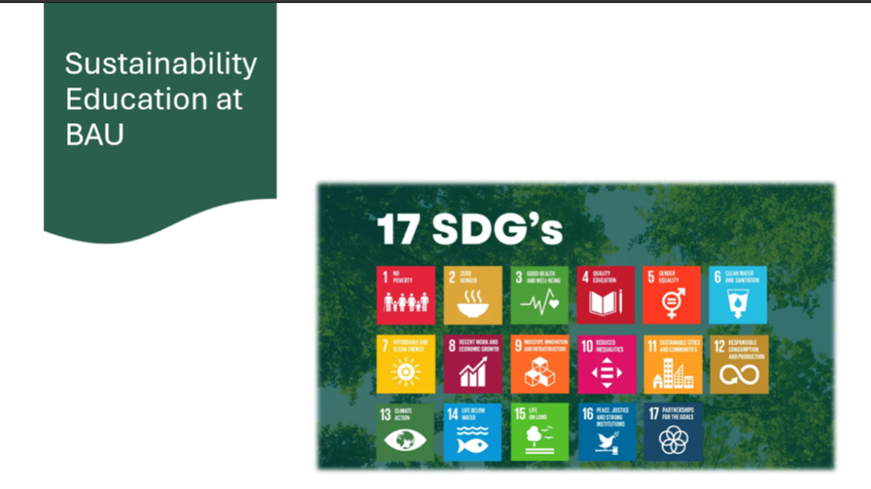
Bahcesehir University – Bahçeşehir University (BAU) strategically integrates sustainability and social impact into its institutional mission, guided by the vision of “contributing to society and achieving excellence.” As both an educational institution and a responsible corporate citizen, BAU implements comprehensive educational programs aligned with the United Nations’ 17 Sustainable Development Goals (SDGs).
Within this framework, BAU has adopted a university-wide educational model that embeds sustainability across all disciplines, incorporating both theoretical and practical components at undergraduate and postgraduate levels in accordance with international standards. The approach ensures that every student—regardless of their field of study—engages meaningfully with sustainability principles and their real-world applications.
To cultivate sustainability awareness and inspire behavioral change among students, BAU systematically integrates SDG-related courses into its curriculum. These courses are designed not only to enhance knowledge but also to encourage students to adopt a sustainability mindset and to act as responsible global citizens. By linking classroom learning with community engagement and applied projects, BAU fosters a culture where sustainability is a daily practice—on campus and beyond.
The university’s sustainability education model operates through the following key components:
The image below shows the structure of sustainability and Sustainable Development Goals (SDG) education programs at Bahcesehir University.
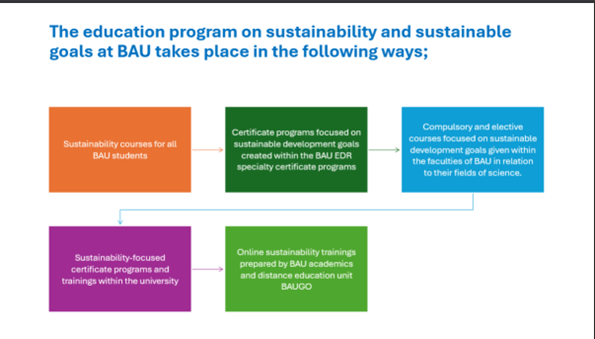
As part of its commitment to embedding sustainability into education, BAU offers Sustainability Courses within its general elective system. According to university regulations, all students are required to complete five general elective courses prior to graduation. While four of these may be freely selected, one must be a sustainability-focused course — making sustainability education a graduation requirement for every Bahcesehir University student.
These courses provide a broad and interdisciplinary understanding of sustainability and explore how environmental integrity, social equity, and economic prosperity can be balanced to build a sustainable future. Students examine local, national, and global challenges while learning about integrated and innovative strategies for sustainable development.
The courses are designed to increase students’ knowledge and awareness of sustainability on both individual and institutional levels, focusing on the following key areas:
Upon completing one of these courses, students will be able to:
Courses focused on sustainability and Sustainable Development Goals, of which students must complete at least one in order to graduate:
EDR is an education model designed by Bahcesehir University that aims to equip BAU students with diverse perspectives, problem-solving abilities, future-oriented competencies, and innovative thinking—enabling them to become globally preferred individuals, regardless of their field of study.
Through the EDR model, students closely follow sustainability, global changes, and technological developments. They quickly adapt to the dynamics of the digital world while gaining opportunities to work with national and international brands in their chosen sectors. As an interdisciplinary model, EDR supports BAU students in becoming active, research-oriented, entrepreneurial, responsible, and leadership-driven individuals throughout their education.
Health Communication Management Program: SDG 3
This certificate program aims to prepare professionals capable of conducting effective communication studies in the health sector. Students receive training on basic health literacy from the Faculty of Health Sciences and health communication from the Faculty of Communication, as well as insights into social media dynamics. Graduates acquire strong communication management skills essential for the healthcare field.
Healthy Living Competency Program: SDG 3
This program aims to help individuals and society establish lasting positive changes in lifestyle and health. Students completing the program gain knowledge in first aid, exercise practices, and proper nutrition methods essential for maintaining a healthy life.
Nutritional Psychology Program: SDG 3
This program prepares professionals to understand and analyze the connection between nutrition and mental health. Students completing the program develop a multidisciplinary approach to addressing and treating eating disorders.
Interactive Methods in Improvement Competency Program: SDG 3
The program provides students with tools to manage business processes effectively through individual and group interaction. It introduces gamification and creative methods to train healthcare professionals who apply interdisciplinary and interactive approaches in their field.
Design, Innovation and Environmental Issues: SDG 11
This program raises awareness about design, innovation, and environmental sustainability, enabling students to orient themselves toward these fields and engage in academic research and creative solutions.
Family Law Program: SDG 5
Students who complete courses on contemporary family law issues receive the Family Law Certificate. Topics include causes and consequences of divorce, property regimes, lineage, and guardianship, supporting a deep understanding of legal mechanisms affecting families.
Sustainability Program: SDG 1 – SDG 7 – SDG 9
This program offers in-depth knowledge on sustainability, sustainable development, energy, and agricultural policies. Combining theory and practice, it provides students with comprehensive training, culminating in a Certificate in Sustainability upon successful completion.
Intellectual and Industrial Rights Program: SDG 9
Organized by the Faculty of Law, this program trains students in industrial property law, copyright and artistic works law, and competition law. Graduates who complete the courses successfully receive an Intellectual and Industrial Property Rights Certificate, enhancing their specialization in this field.
Volunteering and Social Responsibility Program: SDG 17
Volunteering and social responsibility initiatives are vital to achieving the Sustainable Development Goals. This program enhances students’ awareness and understanding of how individuals, NGOs, and the private sector contribute to these goals. Successful participants receive a Volunteering and Social Responsibility Certificate alongside their diploma. The program is open to all BAU students.
3.Sustainability-Oriented Compulsory and Elective Courses in the BAU Curriculum
Bahçeşehir University (BAU) is deeply committed to integrating the United Nations Sustainable Development Goals (SDGs) across its education, research, institutional policies, and operational practices. In line with this commitment, sustainability and sustainable development are embedded throughout the university’s academic programs, reflected in both compulsory and elective courses offered at various levels.
The following list presents the sustainability-focused compulsory and elective courses available within the BAU curriculum. These courses aim to equip students with the knowledge, values, and competencies required to contribute to a sustainable future. The following list presents the course codes and titles of the sustainability-oriented courses offered by the academic departments of Bahçeşehir University. The detailed course descriptions are available on the relevant pages of the university’s official website.
ESE4103 Energy Efficiency, Economy & Environment
ESE3103 Alternative & Renewable Energy Systems I
ESE4207 Alternative & Renewable Energy Systems II
GEP0633: Environment and Sustainable Development
COP4401 Schneider Electric - Energy Efficiency and Savings
ESE4008 Wind Energy
ESE4102 Energy Efficiency in Buildings
ENV4401 Environmental Impact and Risk Assessment
DENT1006 Preventive Dentistry & Introduction to Public Oral and Dental Health
PRL4537 Strategic Communication and Sustainability
ARC3964 Issues in Sustainability
LAW3004 International Maritime Law and Sustainability
BES4079 Sustainable Nutrition
BES3062 Intercultural Differences in Nutrition
VCD1112 Art, Culture and Society
POL4144 Politics of Gender
SOC3005 Sociology of Gender and Family
LAW3081 Women's Rights
HEM3001 Women's Health and Diseases Nursing
ECE1002 Health, Nutrition and Resilience
ACL4001 Introduction to Women’s Studies
SOC3057 Readings in Sociology of Gender
PSY4058 Psychology of Gender
COP3433 FAO - Sustainable Food Systems
CET3052 Selected Topics in Educational Sciences
COP4338 Tazefikir-Creative Thinking and Innovation
ADV4638 Innovation and Entrepreneurship
DYZ2006 Nutrition
MBG4054 Ecology
TDS2003 Public Health
COP4453 Proline – Safe and Smart Cities
ECE4040 Educational Administration in Early Childhood
EDS4010 New Media and Media Literacy in Education
ECE3202 Environmental Education in Early Childhood
COP4119 Play and Art Based Development in Early Childhood
ECE2201 School Readiness and Programs for Elementary Education
ECE3207 School Experience
ECO3577 Health Economics
ECE3104 Child's Mental Health
ECE4105 School Adaptation and Early Literacy Education
ECE3105 Approaches to Teaching in Early Childhood
COP4604 Learning Design With Microsoft Technology
CET2202 Educational Video Design
CET120 Information Technologies in Education
NTD2101 Nutritional Biochemistry I
NTD3170 Nutrition Education and Counseling
NTD3105 Assessment of Nutritional Status in Society
NTD4005 Food Legislation and Control
NTD3069 Geriatric Nutrition
BME3980 Information Technologies in Medicine
TDS2005 Health Tourism
COP4414 Siemens - Biomedical Technology Management
CEN4197 Groundwater Engineering
EAP5105 World Educational Systems
CET4054 Adult Education
EAP5103 Finance and Governance in Educational Institutions
EDS4011 Special Topics in Education I
EDT5001 Educational Technology Field, Theory and Profession
CET3054 Game Based Learning
COP4907 Hasen- Energy Politics and Strategies
ARC2082 Environmental Control Systems
ARC2933 Earth Architecture
BME2063 Biomaterials
INT2061 Human Factors and Universal Design
INT3904 Sustainable Design
INT3921 People and Environment
ESE5502 Sustainable Energy Systems
ARC5406 Critical Thinking in Sustainable Design
SGS5016 Agricultural Production Systems and Sustainable Farming
ARC3965 Green Architecture
SOC3072 Sociology of Migration
COP4405 Nature - Health and Safety Management
ECE4050 Teaching Children’s Rights
ENM4103 Technology and Innovation Management
GAD5106 Games and Education
ECE3001 Language, Arts and Literature for Young Children
EAP5104 Conflict Management in Educational Institutions
BA3568 Sustainable Management
BA4023 Industrial Ecology
BA4455 Social Impact Management
BA4453 Corporate Social Responsibility
ADV3618 Advertising and Society
ALD5019 Child Health and Care
COP4331 Tazefikir Health Communication
PRL4532 Corporate Social Responsibility
PRL4537 Strategic Communication for Sustainability
GEP0201 City and Culture
GEP1634 Exploring the Future of Agriculture
KHK5236 Gender Mainstreaming
SOH5015 Social Gender and Social Services
4.Sustainability-Oriented Training and Certificate Programs
BAU – CIFAL Istanbul, United Nations Institute for Training and Research (UNITAR) Sustainability School
The image below shows the promotional material of the BAU – CIFAL Istanbul, United Nations Institute for Training and Research Sustainability School.
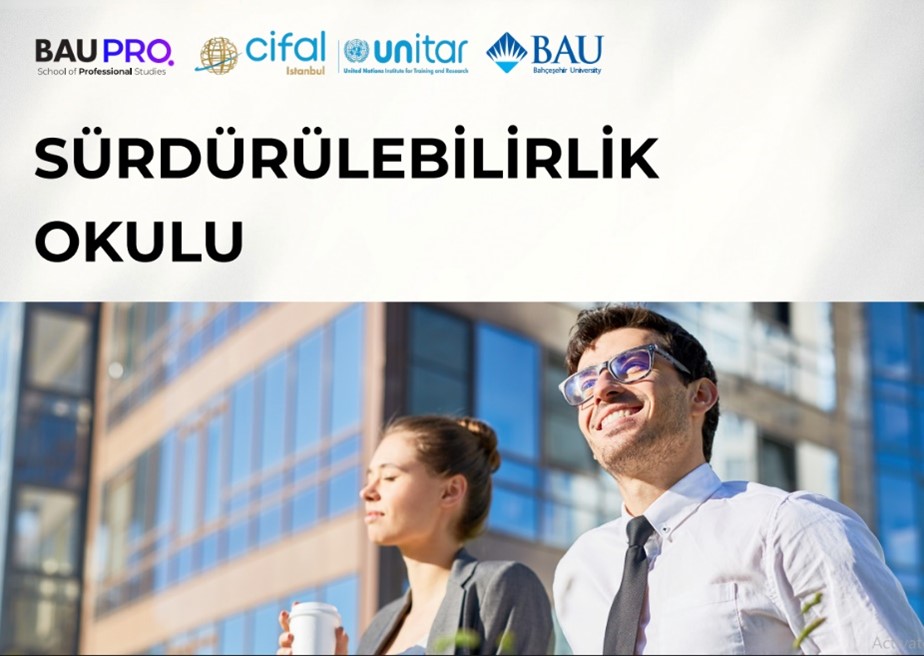
The Sustainability School, jointly developed by Bahcesehir (Bahçeşehir) University (BAU), CIFAL Istanbul, and the United Nations Institute for Training and Research (UNITAR), is one of the university’s flagship education and research initiatives promoting sustainability literacy and leadership. The program equips participants with the knowledge and skills to integrate sustainability principles into professional, academic, and community contexts.
The comprehensive curriculum, designed and delivered by BAU faculty members, is based on a hybrid and lifelong learning model that combines online flexibility with interactive, experience-based education.
Participants engage in a total of 12 modules (48 hours) covering key topics such as environmental and social sustainability, circular economy, green innovation, ESG management, sustainable finance, responsible supply chains, and sustainability communication.
The program is conducted entirely in partnership with UNITAR and awards a jointly accredited international certificate, signed by Bahçeşehir University, CIFAL Istanbul, and UNITAR. This ensures global recognition of learners’ credentials in sustainable development education.
Through its applied learning approach, the Sustainability School empowers professionals, educators, entrepreneurs, students, and the general public to become sustainability leaders—capable of designing innovative and responsible strategies for a more resilient future.
Detailed information about the program and its modules can be accessed via the BAUPRO Sustainability School website.
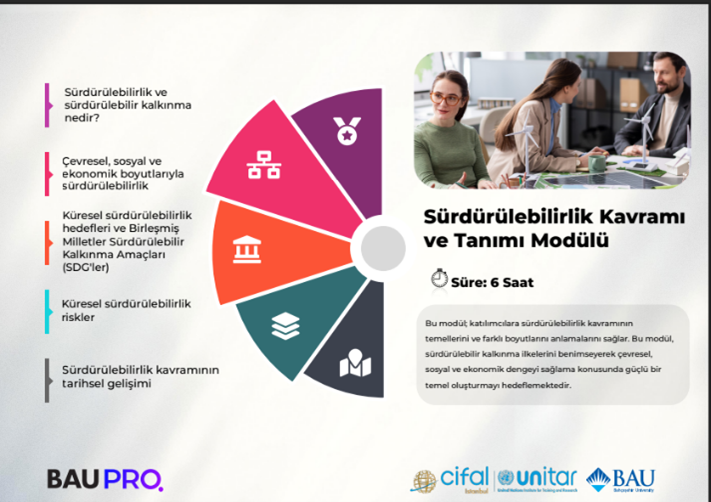
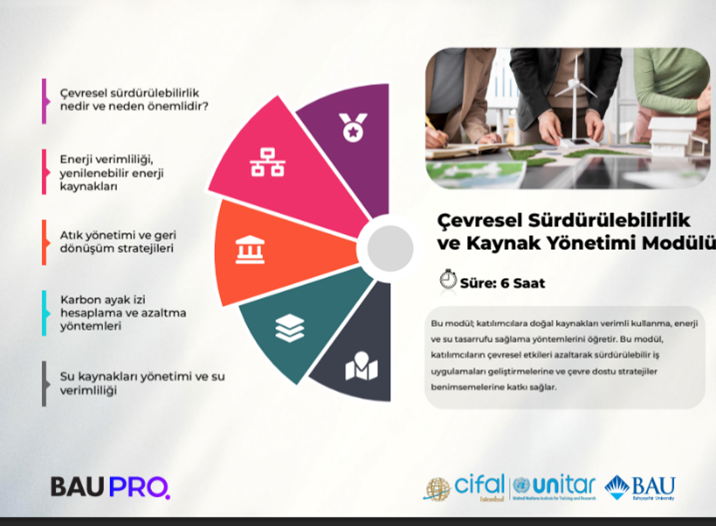
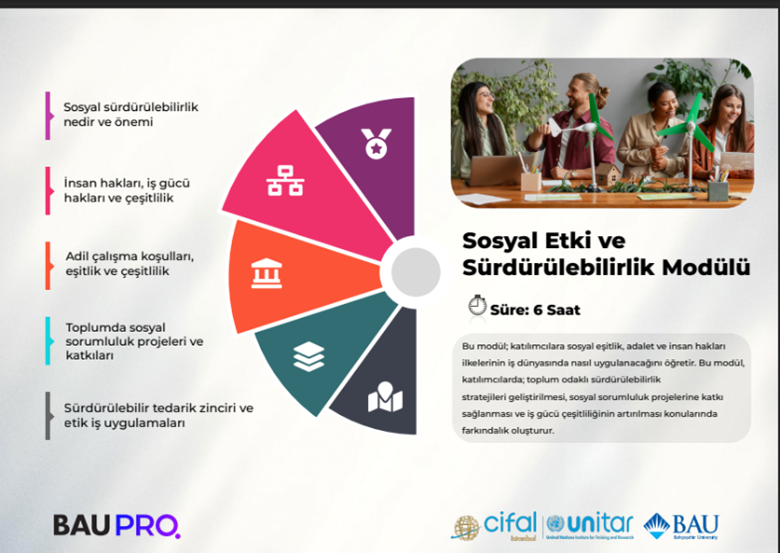
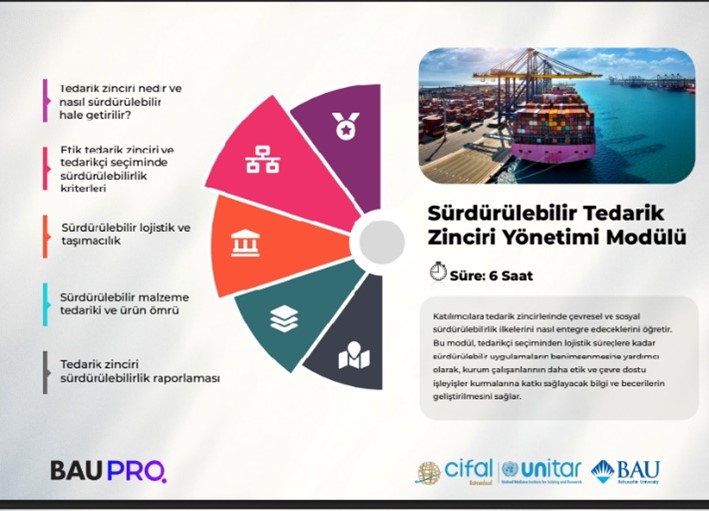
BAU Sustainability Literacy Certificate Program
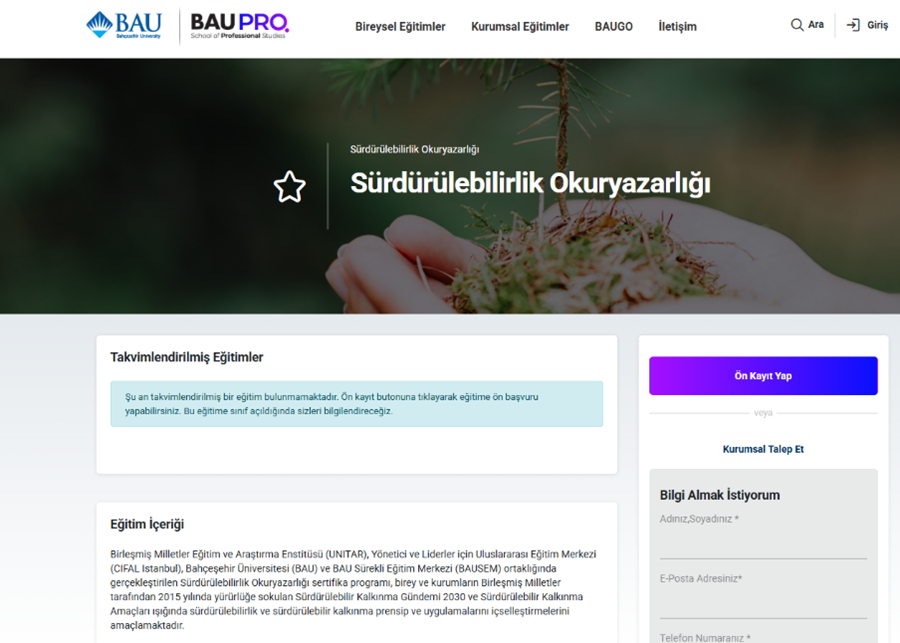
Bahcesehir (Bahçeşehir) University (BAU), in partnership with UNITAR–CIFAL Istanbul and the BAU Continuing Education Center (BAUSEM), offers the Sustainability Literacy Certificate Program to enhance awareness and understanding of the United Nations 2030 Agenda for Sustainable Development.
The program aims to help individuals and institutions internalize the principles and practices of sustainability by providing foundational knowledge on the Sustainable Development Goals (SDGs) and their implementation across various sectors.
BAU Sustainable Living Certificate Program
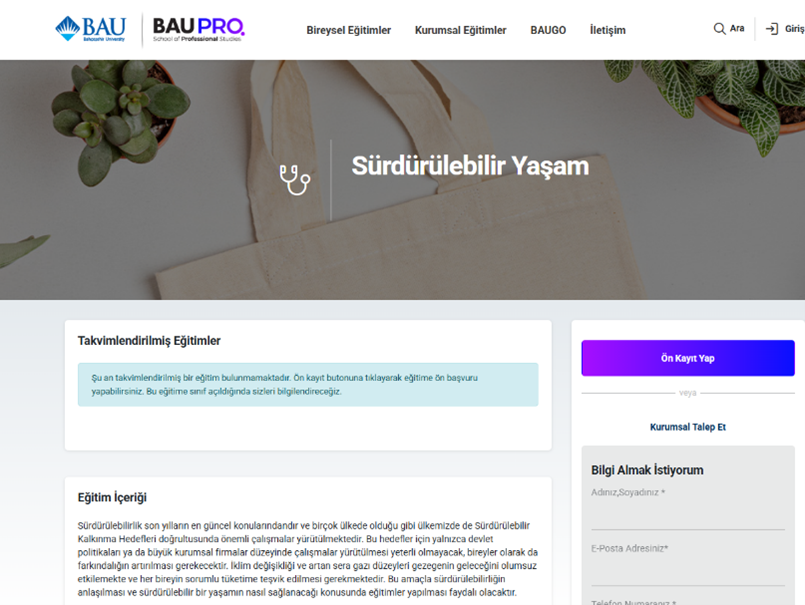
Bahçeşehir University (BAU) offers the Sustainable Living Certificate Program, designed to raise individual and collective awareness on sustainability and responsible lifestyle practices.
The program provides participants with a comprehensive understanding of how everyday choices impact the planet and highlights the importance of sustainable behaviors in achieving the United Nations Sustainable Development Goals (SDGs).
Through this training, participants explore key topics such as climate change, resource efficiency, and environmentally responsible consumption. The program encourages individuals to take an active role in building a more sustainable society and promotes the adoption of lifelong sustainable habits that contribute to a healthier planet.
Bahcesehir Sustainable Marketing and Sustainable Brands Certificate Program
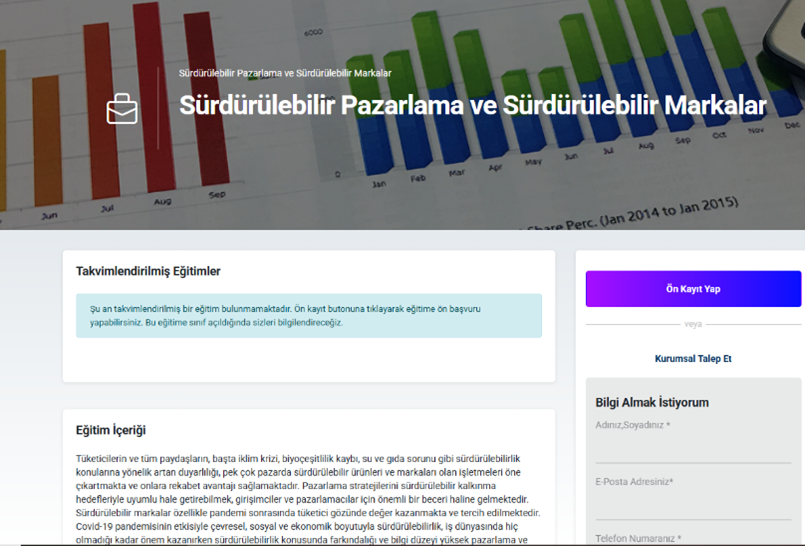
Bahçeşehir University (BAU) offers the Sustainable Marketing and Sustainable Brands Certificate Program, developed to enhance understanding of sustainability-driven marketing strategies and their role in today’s global business environment.
The program explores how sustainability principles can be integrated into brand management and marketing practices to create long-term value for both businesses and society. Participants learn how sustainable approaches can strengthen corporate reputation, build consumer trust, and drive competitiveness in increasingly conscious markets.
5.Online Sustainability Education
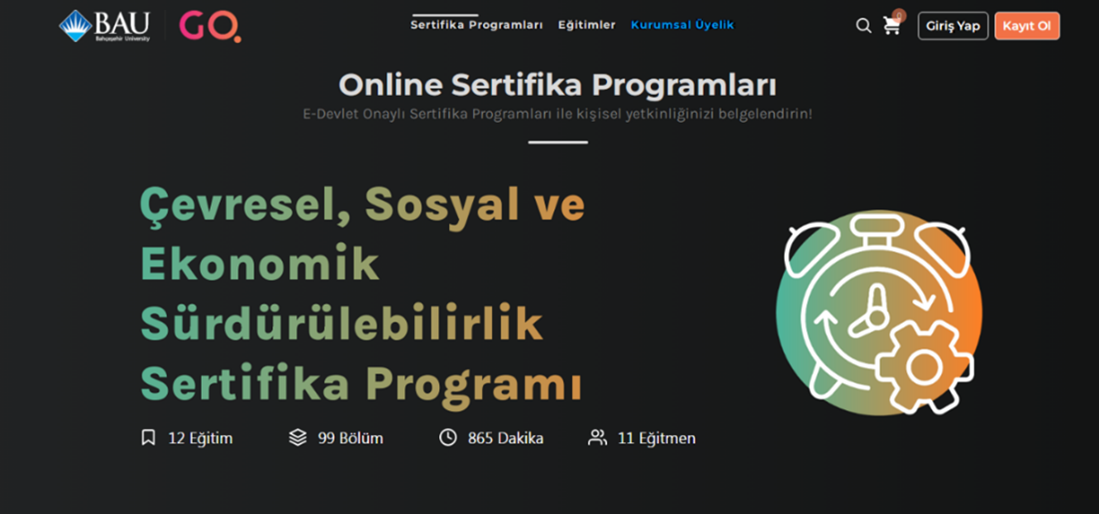
Sustainability-oriented training programs developed by Bahçeşehir University (BAU) faculty members and the university’s Distance Education Unit (BAUGO) aim to enhance students’ awareness and understanding of sustainability. Conducted annually in collaboration with BAU, CIFAL Istanbul, and the United Nations Institute for Training and Research (UNITAR), these courses are offered free of charge to BAU students. Participants who successfully complete all course requirements receive an official certificate, demonstrating their competence and commitment to sustainability education.
These trainings provide comprehensive insights into the principles and practices of sustainable development, covering its environmental, social, and economic dimensions. Designed to equip students with the knowledge and skills necessary to address 21st-century challenges, the programs emphasize both theoretical understanding and the practical application of sustainability concepts.
A collection of sustainability training videos is made available to all BAU students, offering accessible and engaging learning materials that support both academic and personal growth.
This comprehensive Sustainability Certificate Program, developed by Bahcesehir University (BAU) academics, provides a structured and engaging learning experience that deepens participants’ understanding of sustainable development and the United Nations Sustainable Development Goals (SDGs).
The program explores the environmental, social, and economic dimensions of sustainability, combining theoretical knowledge with practical applications to build the skills necessary for tackling complex sustainability challenges.
Comprising 12 modules and 99 sections, the training offers an integrated framework for understanding sustainability from multiple perspectives—linking global principles with local practices. Upon completion, participants strengthen their sustainability literacy, gain actionable insights, and enhance their capacity to contribute effectively to sustainable transformation in both professional and personal contexts.